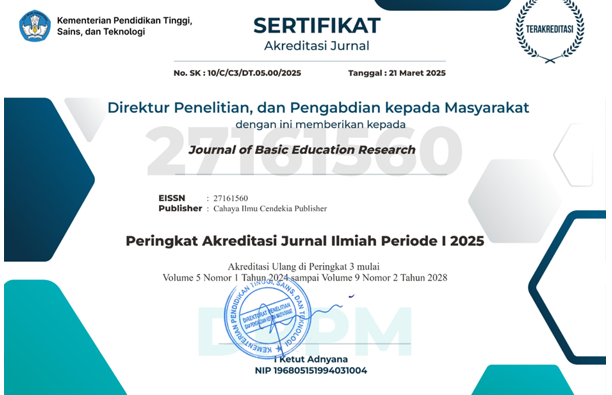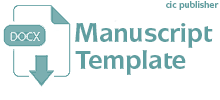Kindergarten Curriculum Revolution: Aligning the Independent Curriculum with the Needs of the Global Education Industry
Abstract
Purpose of the study: This study aims to examine how the Merdeka Curriculum is implemented at TK Darussalam Blokagung Banyuwangi and to identify the challenges and strategies in aligning this independent curriculum with global education demands, as well as to propose practical recommendations for enhancing its implementation
Methodology: Employing a descriptive qualitative case study approach, the research involved one principal and six homeroom teachers, with data gathered through structured observations, semi-structured interviews, and documentation of classroom activities; a comprehensive literature review informed the analysis, which was conducted using manual transcript analysis
Main Findings: Findings reveal that the Merdeka Curriculum enables flexible lesson planning that fosters religious character, independence, creativity, and collaboration, leading to heightened student enthusiasm and engagement; however, implementation barriers—such as limited teacher proficiency in project-based learning, inadequate facilities, and insufficient parental involvement—were evident, prompting the school to conduct regular professional development and strengthen community partnerships to improve curriculum delivery
Novelty/Originality of this study: Uniquely, this study focuses on a rural PAUD setting, offering novel insights into adapting independent curriculum frameworks to meet global education industry requirements in under-resourced contexts and generating context-specific recommendations that advance current understanding of curriculum flexibility and the integration of local and global educational values
References
M. Leonida, “Learning from film to theatre and from theatre to film,” Film Educ. J., vol. 4, no. 2, 2021, doi: 10.14324/fej.04.2.05.
M. J. Phaeton and M. Stears, “Exploring the alignment of the intended and implemented curriculum through teachers’ interpretation: a case study of a-level biology practical work,” Eurasia J. Math. Sci. Technol. Educ., vol. 13, no. 3, pp. 723–740, 2017, doi: 10.12973/eurasia.2017.00640a.
Z. Soleha and K. Mujahid, “Analisis hambatan dan tantangan: implementasi kurikulum merdeka dalam kehidupan sehari-hari guru,” TSAQOFAH, vol. 4, no. 1, pp. 563–574, 2024.
L. Safitri et al., “Analisis kalimat teks anekdot pada buku bahasa Indonesia Kelas X kurikulum merdeka,” J. Creat. Student Res., vol. 1, no. 2, pp. 396–414, 2023, doi: 10.55606/jcsrpolitama.v1i2.1876.
N. I. Halil, H. Yawan, A. N. Hasanah, H. Syam, N. H. Andas, and Marhamah, “A new program to foster inclusion: unraveling language teachers’ pedagogical practices to differentiated instruction,” Int. J. Lang. Educ., vol. 8, no. 2, pp. 370–383, 2024, doi: 10.26858/ijole.v8i2.64997.
D. T. Sari, A. W. Aula, V. A. Nugraheni, Z. K. Dina, and W. Romdhoni, “Penerapan pembelajaran berbasis masalah pada siswa sd untuk menumbuhkan kemampuan berpikir kritis,” Pros. Semin. Nas. Pendidik. Guru Sekol. Dasar, vol. 2, no. 1, pp. 82–96, 2022, doi: 10.25134/prosidingsemnaspgsd.v2i1.30.
A. P. Ananda and H. Hudaidah, “Perkembangan kurikulum pendidikan di indonesia dari masa ke masa,” SINDANG J. Pendidik. Sej. dan Kaji. Sej., vol. 3, no. 2, pp. 102–108, 2021, doi: 10.31540/sindang.v3i2.1192.
Bayu Ananto Wibowo, “Pancasila sebagai landasan filosofi pendidikan karakter kurikulum 2013,” Biormatika J. Ilm. Fak. Kegur. dan ilmu Pendidik., vol. 6, no. 1, pp. 10–19, 2020.
Haryanto et al., “The effect of problem-based learning model on generic science skills and creative thinking skills in science learning,” J. Pendidik. MIPA, vol. 25, no. September, pp. 723–731, 2024, doi: 10.23960/jpmipa/v25i3.pp1022-1036.
M. I. Farisi, “Kurikulum rekonstruksionis dan implikasinya terhadap ilmu pengetahuan sosial: analisis dokumen kurikulum 2013,” J. Ilm. Kependidikan Khasanah Pendidik., vol. 16, no. 2, pp. 147, 161, 2013.
R. Bellová, D. Melicherčíková, and P. Tomčík, “Possible reasons for low scientific literacy of Slovak students in some natural science subjects,” Res. Sci. Technol. Educ., pp. 1–18, 2017, doi: 10.1080/02635143.2017.1367656.
L. S. Ling and S. Krishnasamy, “Information technology capability (ITC) framework to improve learning experience and academic achievement of mathematics in malaysia,” Electron. J. e-Learning, vol. 21, no. 1, pp. 36–51, 2023, doi: 10.34190/ejel.21.1.2169.
K. H. Primayana, “Menciptakan pembelajaran berbasis pemecahan masalah dengan berorientasi pembentukan karakter untuk mencapai tujuan higher order thingking skilss (HOTS) pada anak sekolah dasar,” Purwadita J. Agama dan Budaya, vol. 3, no. 2, pp. 85–92, 2019.
D. Kumalasari, H. Purwanta, and S. Aw, “Comparative analysis of generation z’s digital history literacy in history education majors on java island: a study of history digital literacy,” J. Educ. e-Learning Res., vol. 11, no. 1, pp. 90–96, 2024, doi: 10.20448/jeelr.v11i1.5342.
E. F. Crawley, A. Hosoi, G. L. Long, T. Kassis, W. Dickson, and A. B. Mitra, "Moving forward with the new engineering education transformation (NEET) program at MIT - building community, developing projects, and connecting with industry." 2019. doi: 10.18260/1-2--33124.
A. Abulibdeh, E. Zaidan, and R. Abulibdeh, “Navigating the confluence of artificial intelligence and education for sustainable development in the era of industry 4.0: Challenges, opportunities, and ethical dimensions,” J. Clean. Prod., vol. 437, no. January, p. 140527, 2024, doi: 10.1016/j.jclepro.2023.140527.
Y. Tada, S. Tnaka, T. Yuki, S. Nishino, T. Hasegawa, and T. Matsumoto, “Development and issues of recurrent education for general workers to promote digital transformation of the construction industry in local cities,” Procedia Comput. Sci., vol. 225, pp. 756–764, 2023, doi: 10.1016/j.procs.2023.10.062.
A. Fedorov and G. Mikhaleva, “Current trends in media and information literacy in research and scientific publications of the early 21st century,” Int. J. Media Inf. Lit., vol. 5, no. 2, pp. 153–163, 2020, doi: 10.13187/IJMIL.2020.2.153.
H. Xu, “Cultivating film appreciation and creativity: the development of public film education in mainland China,” Film Educ. J., vol. 6, no. 1, 2023, doi: 10.14324/fej.06.1.03.
G. Mathias and Ø. F. Standal, “What happens to the ‘social’ in psychosocial? Exploring epistemic practices and therapeutic culture in teacher education,” Teach. Teach. Educ., vol. 153, no. September 2023, 2025, doi: 10.1016/j.tate.2024.104818.
D. Dahliani, “Local wisdom in built environment in globalization era,” Int. J. Educ. Res., vol. 3, no. 6, pp. 157–166, 2015.
F. Alatas and L. Fauziah, “Model problem based learning untuk meningkatkan kemampuan literasi sains pada konsep pemanasan global,” JIPVA (Jurnal Pendidik. IPA Veteran), vol. 4, no. 2, p. 102, 2020, doi: 10.31331/jipva.v4i2.862.
Y. N. Dewi, M. Zaim, and Y. Rozimela, “Interactive learning using e-learning module in learning english for senior high school: a review of related articles,” JELITA J. Educ. Lang. Innov. Appl. Linguist., vol. 1, no. 2, pp. 125–134, 2022, doi: 10.37058/jelita.v1i2.5306.
S. Herlina, Y. S. Kusumah, and D. Juandi, “Global research on emerging digital technology: a bibliometric analysis,” J. Adv. Res. Appl. Sci. Eng. Technol., vol. 51, no. 2, pp. 281–294, 2025, doi: 10.37934/araset.51.2.281294.
H. Susanto, D. Setiawan, S. Mahanal, Z. Firdaus, and C. Tsany Kusmayadi, “Development and evaluation of e-comic nervous system app to enhance self-directed student learning,” JPBI (Jurnal Pendidik. Biol. Indones., vol. 10, no. 1, pp. 143–153, 2024, doi: 10.22219/jpbi.v10i1.31451.
O. Dakhi, J. Jama, D. Irfan, Ambiyar, and Ishak, “Blended learning: a 21st century learning model at college,” Internatinal J. Multiscience, vol. 1, no. 7, pp. 50–65, 2020.
Asmayawati, Yufiarti, and E. Yetti, “Pedagogical innovation and curricular adaptation in enhancing digital literacy: A local wisdom approach for sustainable development in Indonesia context,” J. Open Innov. Technol. Mark. Complex., vol. 10, no. 1, p. 100233, 2024, doi: 10.1016/j.joitmc.2024.100233.
M. G. B. Doblon, “Senior High School Students’ Multiple intelligences and their relationship with academic achievement in science,” Integr. Sci. Educ. J., vol. 4, no. 1, pp. 01–08, 2023, doi: 10.37251/isej.v4i1.298.
A. N. Vidyastuti, R. Darmayanti, and R. Sugianto, “The role of teachers and communication information technology (ICT) media in the implementation of mathematics learning in the digital age,” Al-Jabar, J. Pendidik. Mat., vol. 9, no. 2, pp. 221–230, 2018.
F. Nasim, E. A. Khan, R. Qaisara, and I. Shoqat, “Teaching competencies based on comparative assessment at diverse school levels,” Pakistan J. Humanit. Soc. Sci., vol. 12, no. 1, pp. 259–270, 2024, doi: 10.52131/pjhss.2024.v12i1.2033.
A. K. Abdurrahman and R. Ji, “Teacher strategies in realizing teacher pedagogical competence in high school,” Indones. J. Educ. Res., vol. 4, no. 6, pp. 140–146, 2023, doi: 10.37251/ijoer.v4i6.770.
L. Rudge, The Growth of Independent Education Alternatives in New Zealand, vol. 17, no. 6. 2021. doi: 10.29329/ijpe.2021.382.22.
Sukatin, Nur’aini, N. Sari, U. Hamidia, and K. Akhiri, “Pendidikan karakter anak,” Hijaz J. Ilmu-Ilmu Keislam., vol. 2, no. 2, pp. 7–13, 2022, doi: 10.57251/hij.v2i2.783.
N. Choi, S. Kang, H. J. Cho, and J. Sheo, “Promoting young children’s interest in learning english in efl context: The role of mothers,” Educ. Sci., vol. 9, no. 1, 2019, doi: 10.3390/educsci9010046.
S. Campbell et al., “Purposive sampling: complex or simple? Research case examples,” J. Res. Nurs., 2020, doi: 10.1177/1744987120927206.
Copyright (c) 2025 ulfa fitria, Muhammad Imam Khaudli

This work is licensed under a Creative Commons Attribution 4.0 International License.
Authors who publish with this journal agree to the following terms:
- Authors retain copyright and acknowledge that the Journal of Basic Education Research is the first publisher licensed under a Creative Commons Attribution 4.0 International License.
- Authors are able to enter into separate, additional contractual arrangements for the non-exclusive distribution of the journal's published version of the work (e.g., post it to an institutional repository or publish it in a book), with an acknowledgment of its initial publication in this journal.
- Authors are permitted and encouraged to post their work online (e.g., in institutional repositories or on their website) prior to and during the submission process, as it can lead to productive exchanges and earlier and greater citation of published work.





.png)


.png)
.png)


















